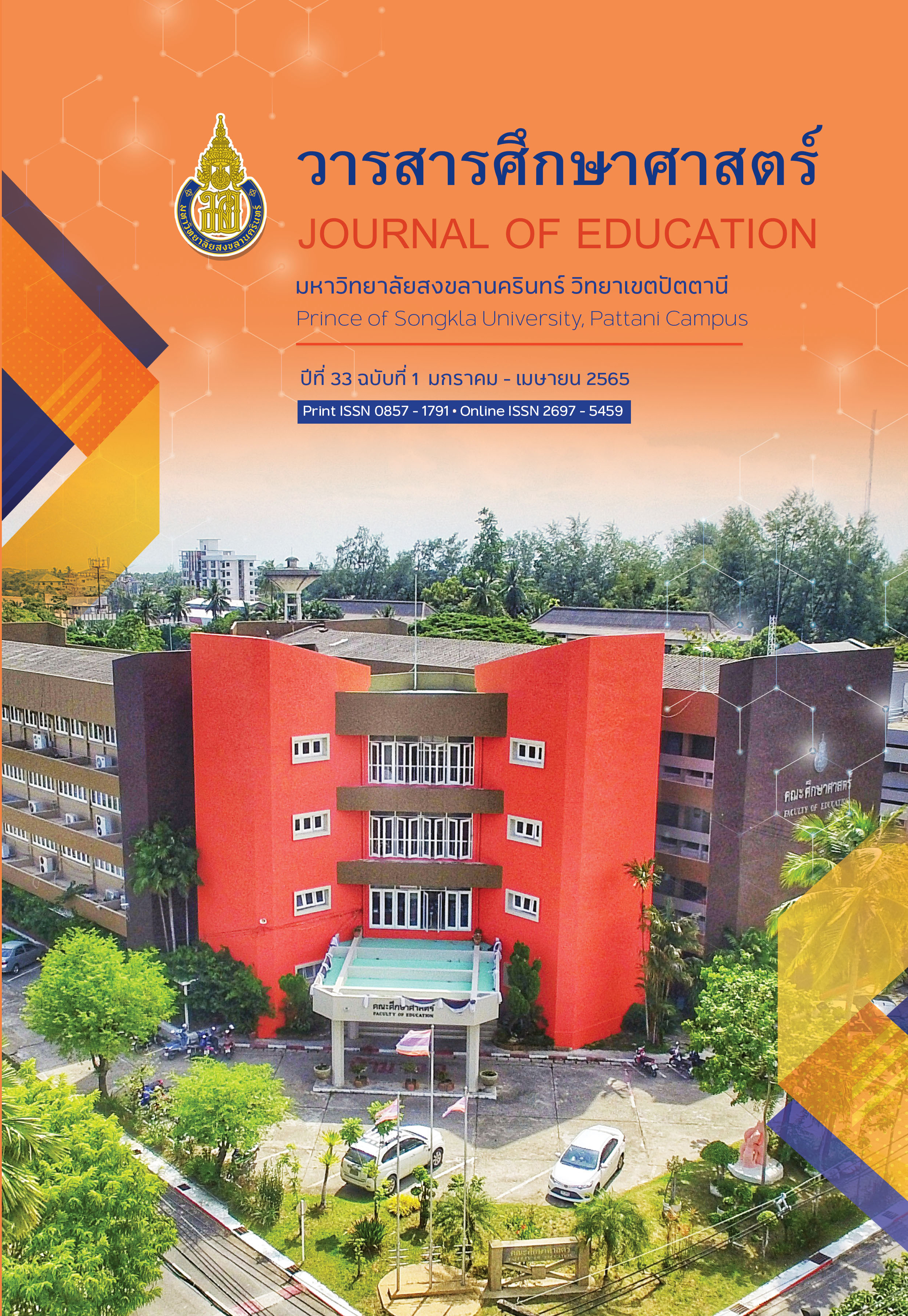ปัญหาในการฟังภาษาอังกฤษเพื่อความเข้าใจของผู้เรียนที่มีความสามารถทางภาษาสูงและผู้เรียนที่ด้อยความสามารถทางภาษา
Main Article Content
บทคัดย่อ
งานวิจัยนี้ใช้กรอบแนวคิด Three-phase model ของ Anderson (1995) เพื่อเป็นแนวทางในการ ศึกษาปัญหาด้านการฟังภาษkอังกฤษของนักศึกษาชั้นปีที่ 1 ของมหาวิทยาลัยแห่งหนึ่งในภาคใต้ โดยกลุ่มตัวอย่างของงานวิจัยนี้ประกอบไปด้วยนักศึกษาจำนวน 30 คน ซึ่งได้มาจากการสุ่มนักศึกษาจำนวน 1,750 คนที่ลงเรียนรายวิชาภาษาอังกฤษพื้นฐานและแบ่งออกเป็นผู้ที่มีความสามารถในการฟังสูง 16 คน และผู้ที่ด้อยความสามารถในการฟัง 14 คน การเก็บข้อมูลเก็บเป็นรายบุคคล โดยให้แต่ละคนฟังบทฟัง ทำชิ้นงานเพื่อตรวจสอบความเข้าใจ และให้สัมภาษณ์การระลึกข้อมูลหลังการฟังทันที (Immediate stimulated recall) เพื่อสะท้อนปัญหาขณะฟังบทฟัง ผลการวิจัยพบว่ากลุ่มตัวอย่างที่ด้อยความสามารถในการฟังมีปัญหาในการฟัง 2 ระดับ ปัญหาระดับเสียง (Perception) คือ สามารถฟังภาษาอังกฤษออกเป็นบางคำเท่านั้น ปัญหาระดับคำ (Parsing) คือฟังข้อความที่ตามมาไม่รู้เรื่องเพราะจดจ่อกับการฟังแต่ละคำ ปัญหาระดับการตีความ (Utilization) นั้นเป็นปัญหาร่วมของกลุ่มตัวอย่างทั้งสอง ปัญหาที่พบคือมีความสับสนในการจับประเด็นสำคัญ ในขณะเดียวกัน คะแนนที่ได้จากการทำชิ้นงานสะท้อนว่ากลุ่มตัวอย่างที่ด้อยความสามารถในการฟังมีปัญหาระดับการตีความมากที่สุด ข้อแนะนำสำหรับงานวิจัยในอนาคตคือการศึกษาตัวแปรอื่น ๆ ที่อาจส่งผลต่อการฟังโดยให้ฟังบทฟังหลากหลายประเภท (Text types) เช่น การฟังบรรยาย การสนทนา และการฟังโฆษณา และทำชิ้นงานที่ต้องใช้ความสามารถในการรำลึกข้อมูล (Delay recall tasks) เช่นการตอบคำถามสั้น ๆ การสรุปความ ซึ่งสามารถสะท้อนกระบวนการคิดที่สื่อให้เห็นปัญหาการฟังในเชิงลึกได้
Article Details

อนุญาตภายใต้เงื่อนไข Creative Commons Attribution-NonCommercial 4.0 International License.
เอกสารอ้างอิง
Al-Nouh, N. A. & Abdul-Kareem, M. M. (2017). EFL college students’ perceptions of the difficulties of comprehending academic English lectures. World Journal of Educational Research, 4(3), 466–495.
Anandapong, S. (2011). A study of English listening problems and listening proficiency of business students at Bangkok University. [Master Thesis, Thammasat University]
Anderson, J. R. (1995). Cognitive psychology and its implications (4th ed.). W. H. Freeman and Company.
Anderson, A., & Lynch, T. (2003). Listening. Oxford: Oxford University Press.
Becker, A. (2016). L2 students’ performance on listening comprehension items targeting local and global information. Journal of English for Academic Purposes, 24, 1–13. doi.org/10.1016/j.jeap.2016.07.004
Berne, J. E. (2004). Listening comprehension strategies: A review of the literature. Foreign language annals, 37, 521-531.
Bonk, W. J. (2000). Second language lexical knowledge and listening comprehension. International Journal of Listening, 14(1), 14-31. doi.org/10.1080/10904018.2000.10499033
Bowles, M. (2010). Concurrent verbal reports in second language acquisition research. Annual Review of Applied Linguistics, 30, 111-127.
Brown, R., Waring, R., & Donkaewbua, S. (2008). Incidental vocabulary acquisition from reading, reading-while-listening, and listening to stories. Reading in a Foreign Language, 20, 136–63.
Chang, A. C.-S., & Read, J. (2006). The effects of listening support on the listening performance of EFL learners. TESOL Quarterly, 40(2), 375-397. doi.org/10.2307/40264527
Chang, A. C.-S., Wu, B. W.-P., & Pang, J. C.-L. (2013). Second language listening difficulties perceived by low-level learners. Perceptual and Motor Skills, 116(2), 415–434. doi.org/10.2466/22.23.PMS.116.2.415-434
Chao, J. Y. G. (2013). Factors affecting college EFL learners’ listening comprehension and listening problems. NCUE Journal of Humanities, 8, 71-84.
Chen, A. (2013). EFL listeners’ strategy development and listening problems: A process-based study. The Journal of Asia TEFL, 10(3), 81-101.
Clare, A., & Wilson, J. (2015). Speak out. (2nd ed.). Pearson education.
Cobb, T. (n.d.). Web Vocabprofile. Retrieved from http://www.lextutor.ca/vp/
Cotterall, S. (1999). Key variables in language learning what do learners believe about them? System, 27(4), 493-513.
Chonprakay, S. (2009). An investigation of listening problems of Thai undergraduate students. [Unpublished master’s project. King Mongkut’s University of Technology of North Bangkok]
Cubalit, A. N. (2016). Listening comprehension problems of Thai university English learners. Proceeding of the Third International Conference on Language, Literature & Society. (pp. 207–214). Sri Lanka: International Center for Research and Development.
Feyton, C. M. (1991). The power of listening ability: an overlooked dimension in language acquisition. The Modern Language Journal, 75(2), 173-80.
F
oley, J. A. (2005). English In…Thailand. RELC Journal, 36(2), 223–234. doi.org/10.1177/0033688205055578
Goh, C. C. M. (1999). How much do learners know about the factors that influence their listening comprehension?. Hong Kong Journal of Applied Linguistics, 4(1), 17-42.
Goh, C. C. M. (2000). A cognitive perspective on language learners' listening comprehension problems. System, 28(1), 55-75. doi.org/10.1016/S0346-251X(99)00060-3
Graham, S. (2006). Listening comprehension: The learners’ perspective. System, 34(2), 165–182. doi.org/10.1016/j.system.2005.11.001
Hasan, A. S. (2000). Learners’ perceptions of listening comprehension problems. Language, Culture and Curriculum, 13(2), 137–153.
Jensen, C., & Hensen, C. (1995). The effect of prior knowledge on EAP listening performance. Language Testing, 12(1), 99-119.
Joyce, P. (2019). The relationship between L2 listening proficiency and L2 aural language processing. PASAA, 57, 9-32.
Julamonthol, T. (2015). English listening comprehension problems of employees at an international automotive company in Thailand. [Master Thesis, Thammasat University]
Mackey, A. & Gass. S. M. (2005). Second language research: Methodology and design. Lawrence Erlbaum.
Noom-ura, S. (2013). English-teaching problems in Thailand and Thai Teachers’ professional development needs. English Language Teaching, 6(11), 139-147.
Nunan, D. (1997). Designing and adapting materials to encourage learner autonomy. In P. Benson, & P. Voller. Autonomy and Independence in Language Learning. Harlow: Longman, 192 - 203.
Osada, N. (2004). Listening comprehension research: A brief review of the past thirty years. Dialogue, 3, 53-66.
Oxford, R. (1993). Research update on teaching L2 listening. System, 21(2), 205-211.
Park, G.-P. (2004). Comparison of L2 listening and reading comprehension by university students learning English in Korea. Foreign Language Annals, 37(3), 448–458. doi.org/10.1111/j.1944-9720.2004.tb02702.x
Rost, M. (2002). Teaching and researching listening. Longman Sanpatchayapong, U. (2017). Development of tertiary English education in Thailand. In E. Park & B. Spolsky (Eds.), English education at the tertiary level in Asia: From policy to practice. (pp. 168-182). London: Routledge
Sweller, J., Ayres, P., & Kalyuga, S. (2011). Cognitive load theory. New York: Springer.
Sriprom, C. (2011). A study of the English listening comprehension problems for EFL learners at the faculty of ICT, Silpakorn University. [Master Thesis, Thammasat University]
Stæhr, L. S. (2008). Vocabulary size and the skills of listening, reading and writing. The Language Learning Journal, 36(2), 139–152. doi.org/10.1080/09571730802389975
Suwannasit, W. (2018). EFL learners’ listening problems, principles of teaching listening and implications for listening instruction. Journal of Education Naresuan Unversity, 21(1), 345-359.
Tamtani, M., Tipayasuparat, N., & Chansmuch, A. (2019). English listening difficulty of passenger service officers, state railway of Thailand. RSU Journal, 14(2), 111-121.
Tran, T., Q., & Duong, T., M. (2020). Insight into listening comprehension problems: A case study in Vietnam. PASAA, 59, 77-100
Vandergrift, L. (2002). “It was nice to see that our predictions were right”: Developing metacognition in L2 listening comprehension. The Canadian Modern Language Review, 58(4), 555–575.
Vandergrift, L. (2007). Recent developments in second and foreign language listening comprehension research. Language Teaching, 40(30), 191-210.
Wattajarukiat, T. (2012). The investigation of perception of the listening strategies and listening difficulties of undergraduate students. [Master Thesis, Prince of Songkla University, Songkhla]
Zhang, Z. & Zhang, L., J. (2011). Developing and validating a listening comprehension problems scale for enhancing Chinese university students' metacognitive awareness of L2 listening. The Journal of ASIA FEL, 8(3), 161-189.
Zhao, Y. (1997). The effects of listeners' control of speech rate on second language comprehension. Applied Linguistics, 18(1), 49-68.


